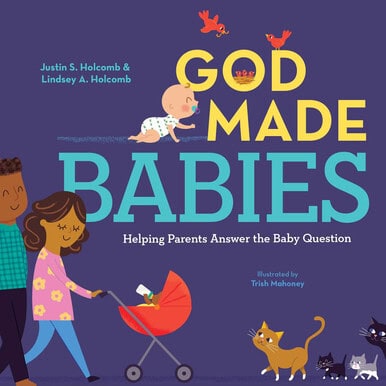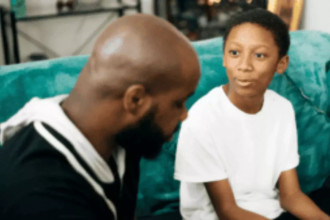Preview:
Dr. Justin Holcomb: God wanted you like, you know, the frogs, the flowers, the trees, the universe was made with intricacy and on purpose that He wanted you, ’cause that’s the question when they’re saying, “Where do babies come from?” They’re not trying to ask a technical question.
End of Preview
Jim Daly: Right.
Justin: They’re kind of wondering about themselves-
Jim: Right.
Justin: … like, “Did God have me in mind?” How awesome that, as parents, we get to tell children not just we wanted to have you in our life. Like, that’s really cool. Tha- that’s great for a child to hear like, “Mom and dad wanted you,” but to say, “God wanted you in His world…”
John Fuller: Well, that’s Justin Holcomb and he and his wife, Lindsey, are with us today on Focus on the Family with Jim Daly. Thanks for joining us. I’m John Fuller and they’re here to share about how you can talk with your children about where babies come from.
Jim: John, let me ask you. How did you approach the talk? (laughs)
John: The talk about where babies comes from?
Jim: Yes.
John: I mean, there are stages, obviously. There are the, the smaller children, uh, easy discussions, and then there are the longer conversations. We went off for a fun weekend. Uh, I would take the boys and Dena would take the girls and it was one on one time and we would have these long, flowing conversations.
Jim: (laughs) And did the boys say, “Oh, that was fun”?
John: (laughs)
Jim: I didn’t quite get that reaction.
John: I think the boys had a lot of fun-
Jim: (laughs)
John: … and then there were some not fun moments, but they appreciated it anyway.
Jim: I heard, “That’s gross.” (laughs) That’s what one of them told me-
John: (laughs)
Jim: … so I felt like I caught it in time, right?
John: That’s exactly the reaction-
Jim: But it’s so good and, you know, hopefully the Christian community is managing this better than the world at large. But everybody could do better talking to their children about where babies come from and it starts at a young age, you know?
John: Mm-hmm.
Jim: It doesn’t have to be the full (laughs) beans right, right at the beginning.
John: Right.
Jim: You know, you see nature and, and we’re gonna talk about how we can talk to our children at different ages and stages about where babies come from. And, uh, mom and dad, if this is already making you uncomfortable, I’m glad ’cause, uh, that’s what we wanna do. We wanna help equip you for that time where you really need to, to give them the talk. And hopefully, again, that’s a conversation that’s over many, many episodes, not just one single thing. The world wants to teach your kids. They’re gonna grab your children and probably do a brutal job-
John: Mm-hmm.
Jim: … in defining sexuality, so, uh, this is a better way to go. We have some great guests today, Justin and Lindsey, as we, uh, said at the top there. They’ve done a great job, uh, putting a book together called God Made Babies: Helping Parents Answer the Baby Question.
John: Mm-hmm. Yeah. It’s a great resource. And Justin and Lindsey have been here before. They’ve spoken on similar topics. Some years ago, they co-founded an organization dedicated to rescuing and protecting women and girls. Justin is a minister and a seminary professor and Lindsey works at a classical Christian school. And the book that Jim mentioned is available from Focus on the Family, God Made Babies: Helping Parents Answer the Baby Question. It’s a terrific resource for kids and parents to read together and you can get it when you go online at focusonthefamily.com/broadcast.
Jim: Lindsey and Justin, welcome back.
Justin: Thank you for having us.
Lindsey Holcomb: Thank you.
Jim: It’s good to have you back. Why is this such a funky topic (laughs) for us as parents? I mean, I think it’s an important topic but we all did a little like, “Hmm, uh, well, we’ll talk about that later,” or something like that.
Justin: I think we’ve had numerous experiences as kids, children having these talks or not having the talks, so I think that’s part of it. Also, because I think many parents have some guilt wrapped up with the topic-
Jim: Mm-hmm.
Justin: … also some shame, depending on what they’ve done or what’s been done to them. So, I think for that reason also because of how culture makes such a huge deal about the topic of sexuality, but in a way that actually doesn’t get to the foundational issues-
Jim: Mm-hmm.
Justin: … of how, how a doctrine of creation should inform how this is talked about, how it’s celebrated from taking a gift and making it way more than just a gift. Making it an identity, making it, um-
Jim: Ideology.
Justin: An ideology.
Jim: Yeah.
Justin: So, there’s, there’s so much wrapped in with it that, I think, parents… I mean, I was nervous. I mean, parents are nervous. I had a great experience and we’ll tell our stories about that. I had a great experience learning about the topic of how babies were made. Lindsey had a different… It’s not necessarily bad, just different experience. So I think that plays in to why people are… And, and you, you wanna talk to your kids about this in a way that doesn’t freak them out or weird them out-
Jim: (laughs) So true.
Justin: … and so you wanna do it right. So, it’s a lot playing into this, I think.
Jim: I think the other thing, and Lindsey I’ll aim this at you, but the… You know, we feel like we’ve got to do it perfectly, you know, like it’s placing something on a, on a wobbly mount, you know? We gotta just find the perfect spot to place this in, a perfect age, but it’s not that. It is kind of an ongoing conversation. It starts with age-appropriate observations or things like that. Um, so how do we let some of the pressure out as parents to make sure it’s perfect, it’s on the right time, it’s, you know, not too soon, not too late?
Lindsey: Absolutely. That is a great question ’cause I think, as Justin was saying, so many parents think, “I’m gonna mess it up, so I’m not gonna have a conversation and we’ll just delay and delay.” But little kids are naturally curious about where babies come from. They see women that are pregnant in a grocery store or they, you know, notice a new baby comes home whether to their own family or their friends have, you know, new siblings come into the picture. And so they’re naturally curious, but I would just encourage parents have mini and many conversations, small conversations ongoing even from a small age. And I think that’s just a habit you can build into your family household, like other healthy habits you’re probably trying to, to emulate within the structure of your families. Having small conversations over time so that it’s not weird, so that when they’re 13, 14, you’re not sitting them down for this huge, long talk that’s really gonna shock them. But if you’re having these small conversations over time, these little conversations or observations or things that you see maybe in a TV show, then that allows your child to realize, “Okay, when I have a question, that maybe my parents haven’t covered… They’re used to this topic. They’re used to talking about things that are maybe a little bit uncomfortable. I can broach this topic with them rather than I’m gonna freak out my parent.”
Jim: You know, one of the, one of the important things, too, is, uh, trying to decipher as a parent, “What is the question actually being asked here?” (laughs)
Lindsey: Yes. Yes.
Jim: That’s a good one. We had a… I remember here at Focus, I jumped on the elevator with Troy and he said, “Daddy, I know the S-word.” And I went, “Uh, what word is that?” “Stupid.” And I said, “Yeah, we don’t say stupid. We don’t wanna ever say that word.” And I’m going, “Okay. I’m glad it wasn’t the other one.”
Lindsey: It could’ve gone in different directions. (laughs)
Jim: But it… You know, that’s part of it.
Lindsey: Right.
Jim: And as a parent, especially around sexuality, we need to make sure what question they’re asking-
John: Mm-hmm.
Jim: … ’cause you can over-deliver-
John: (laughs)
Lindsey: Yes.
Jim: … uh, information that they’re not ready to hear, right?
Lindsey: Absolutely.
Justin: Take it, take it to a completely different topic, like teaching a, a sport to one of your children like baseball. There’s different levels-
Jim: Right.
Justin: … of what you’d say about baseball. “Well, you have a bat and a ball and you have these gloves and you hit the ball.”
Jim: Right.
Justin: And then you just say the basics of what the child like, “Why do you like baseball, dad?” “I like it ’cause of this and this is what they do.” Well, then you start getting into more details about how many players are on the field-
Jim: Mm-hmm.
Justin: … and how many strikes there are, and then you start getting into, like, the nuance of-
Jim: The technique of the position.
Justin: … a foul ball and-
Lindsey: (laughs).
Justin: … and a curveball and why you’d bring in a, a, a pitcher and, and a pinch runner and all that kind of stuff. And so following Lindsey’s lead, um, as a father of two daughters who are now teenagers, I remember years ago, thinking, “How do we do this?” And she said, “Mini and many.” I mean, that was just mini and many, make it normal, answer the question. And that was so helpful, because what happens is we had just assumed so much what the question means. “Where do babies come from?” Well, you can literally say, “Well, a, a little part from dad and a little part from mom. God made it so baby will grow.” And we got 18 months out of that very simple answer, where I… If I wasn’t there, if, if I was there alone, I would’ve gone into the nuances-
Jim: Right.
Justin: … of the mechanics-
Lindsey: A lecture. (laughs)
Justin: … that weren’t needed at the time.
Jim: Right.
Justin: And I remember we had 18 months of cushion before they got specific on, “Well, how did that little part of mommy and little part of daddy, you know, how did that happen?”
Jim: Yeah. Just to extrapolate on that, I think it’s really critical, though, something you said I wanna highlight, which is the person, the parent that might say, “You know, we don’t talk about that. We’ll talk about that later.” It kinda shuts down that normal curiosity and that- that’s not a good thing to do, right?
Lindsey: Absolutely. And I would say definitely follow your child’s lead, answer their questions, but you also might need to initiate, ’cause if they’re not ever asking questions, you need to say, “Hey, you notice that little baby? Where do you think that baby came from?” So you might have to actually kind of set the tone of the conversation. And then, of course, parents will say often to us like, “Well, my child’s just not… They’re not even wondering about this. They’re 13 and they’ve never asked any questions.” And I’m like, “Oh, they are getting information from their friends, my, my dear friend.”
Jim: Right. Exactly.
Lindsey: And that’s the big thing I would say to parents is, “You’re not gonna mess it up if you’re having little and often conversations. That is the best thing you can do. You’re not gonna mess it up.” You might need to go back and be like, “Hey, you know, I, I needed to think about that question a little bit. I, I, I have an answer now.” Like, you can buy yourself some time if you feel caught off guard and you can just say, “Hold on. Let me, let me think how I, how I should explain that best,” and go away and do some research and come back. But if your child is older and hasn’t started asking any questions, that is a place where a parent needs to step in and-
Jim: Initiate.
Lindsey: … start initiating.
Jim: That’s good.
Lindsey: For sure.
Jim: Justin, in fact, uh, I think you had, uh, an experience in kindergarten-
Justin: I did.
Jim: … that kinda got you rolling. So, describe that. That’s pretty early, kindergarten.
Justin: Kindergarten. A- and I was born in September, so I was a young kindergarten-
Jim: Yeah.
Justin: … uh, student. So during recess, we would go to recess and then come back for show and tell. So, I went out to recess, I caught frogs mating, and so I caught them, put them on my hand, and I asked the teacher. I was like, “I have frogs. Can I go first for show and tell?” She said, “Absolutely.” So I came in and I unveiled, I opened up my hands, I was like, “Look, look at these frogs.” And the teacher looked over and I remember… I still remember her face-
John: They were still engaged in the act?
Justin: They were still, uh, dancing-
Jim: Mm-hmm.
Justin: … as she said. She… I said, “What’s happening?”
Jim: (laughs)
Justin: And she said, “The frogs are dancing. When you go home, tell your mom and dad that you saw frogs dancing.” And that was it. I mean, she handled it masterfully. So I remember getting home and kinda telling about the day. It was, it was just me at the time. My mom was just pregnant with my, my younger sister. And having dinner, my feet weren’t hitting the, hitting the floor and I’m kicking and my dad said, “How was school?” I was telling him and it hit me. I was like, “Oh, I was supposed to tell you about the frogs dancing. I caught frogs and the teacher said they were dancing and to tell you.” And I still remember my mom and dad looking each other and-
Jim: (laughs) “Is that what I, I think it means?” Right.
Justin: And, and, uh, I, I noticed it was a different look in their eye.
Jim: (laughs)
Justin: And then my dad said after dinner, “You know, before you go and play, let’s talk for a little bit.” My dad’s an artist and so he sat down, drew a ma- male body and a female body. It was just so normal and it was actually accurate ’cause he was an artist and it didn’t… It was just normal and then he explained. He just went for it and explained everything, but he did it in such a way that had so much dignity. He talked about how God made the bodies, the differences of the bodies, and so he made it this, this wonder. It was amazing, I mean, as a five-year-old. And then, he told me, “This is a conversation for other children to have with their parents, so don’t say anything to anyone. Will you promise me that?” And I said, “I, I… Absolutely.” I wouldn’t know where to start. So, I went back to school and explained everything to them like I wasn’t supposed to.
Lindsey: (laughs)
Jim: Yeah. There you go, like you weren’t supposed to. So, you’re that kid? See, that’s what we’re talking about that. Lindsey, we got the frog story. (laughs)
Lindsey: (laughs)
Jim: What was your experience as a child?
Lindsey: I didn’t get that. Uh, my mom is a nurse and so I got a very, like, kind of probably middle school biology video was shown to my sister and I, but it wasn’t followed with a conversation. It wasn’t followed with any Q&A. Um, it was just, “Here’s the video and then you go on your way.” So, a lot of my education was through friends. Um, I grew up in the ’80s so I… the social media wasn’t there. But I think of kids nowadays, if they weren’t getting those conversations from their parents and from safe adults, they’re going to get a lot of information from the internet, which is gonna be really poor, and then from their friends. And some of that might be good if they have great parents speaking into their lives, but some of it might be really haphazard. So, just going back to that idea of parents, the role, the privilege that a parent can play is, is huge to be able to tell your child, “You were made on purpose, you were created by God on purpose, and you’re intended to be here.” And that is beautiful. And so if we can keep pointing our kids to goodness and truth and beauty, um, just to encourage parents, you can’t mess it up from there.
Justin: And that’s the beautiful part, because if you start with the foundation of God creating, you can get to in from a, a nurse’s point of view or my father’s artist point of view, but you’re still getting the intricacy of what God was doing to make the world inhabitable and is, is a fancy word for it called the anthropic principle, that He made the universe set for humans to thrive and exist. And that God wanted you like, you know, the frogs, the flowers, the trees, the universe was made with intricacy and on purpose that He wanted you, ’cause that’s the question when they’re saying, “Where do babies come from?” They’re not trying to ask a technical question.
Jim: Right.
Justin: They’re kind of wondering about themselves-
Jim: Right.
Justin: … like, “Did God have me in mind?”
Jim: Yeah.
Justin: How awesome that, as parents, we get to tell children, “Not just we wanted to have you in our life…” Like, that’s really cool. That- that’s great for a child to hear like, “Mom and dad wanted you.” But to say God wanted you in His world, He made all of this and He wanted you in His world for a reason and He made you the way you are, the way you look… You have certain gifts and there’s something that you do that God made you for this world that’s important. That’s a great dignity.
John: That is so deep. And, uh, this is Focus on the Family with Jim Daly. Our guest today are Justin and Lindsey Holcomb and, uh, we’re so glad to have them as they share big thoughts about who we are and then, um, a lot of really practical things in their children’s book, God Made Babies: Helping Parents Answer the Baby Question. We’re all about equipping you as a parent to do this well and we encourage you to get in touch with us for a copy of this book. Uh, we’ve got the details at focusonthefamily.com/broadcast.
Jim: Let me ask you. In the book, you, you used an illustration of pollination to express to a young child some, you know, the concept of where babies come from. Describe it for all of us and then does it work effectively? Do kids walk away from that illustration of the bee? Uh, is it a sufficient illustration for young kids to go, “Oh, okay. I get it”?
Lindsey: The birds and the bees.
Justin: There’s a, there’s, there’s reasons it’s called birds and the bees. Uh, with the flower conversation, you actually get the idea of seeds which is helpful for a small part from dad connects with a small part from the mom. And so we talked about birds and bees ’cause you get to the birds, you have eggs, so you a- you’re actually setting up the conversation for later on. But specifically, the flower conversation’s actually really helpful because there’s a part of the flower that’s called the male part of the flower. When you have a lot of confusion about man and woman, male and female in the culture, and you have flowers that have male parts and female parts, that’s really helpful and, and kind of ground, uh, foundation laying. And so because it’s… It’s helpful because it starts laying the ground of as, as a flower. I mean, God made flowers and trees able to make other things like flowers and trees.
Jim: Mm-hmm.
Justin: Like this flower, these flowers can make another flower, but it actually takes at least two flowers to make another flower. So, you’re, you’re, you’re getting a lot of the groundwork in place of a mom and a dad and specific parts of mom and dad making another. So, it can be helpful and you can start there. You’re, you’re getting, you’re getting a male and a female, you’re getting parts that make and reproduce, and so that’s… And, and then because there’s… It’s connected to, you know, bees, birds, butterflies, which are the carriers of pollen, there’s a fascination of them just learning. It’s going… You used the word a while ago: curiosity. And that’s what’s so helpful is that children are asking this because they’re curious about themselves and how God made the world. That’s actually fascinating if you think about how all the thing that has happen for another flower to exist is just really, is just cool.
John: Mm-hmm.
Justin: And I- I could imagine… I don’t have to imagine. Children being fascinated about what they’re learning about reproduction from just a flower and then you move on from there.
Jim: Yeah.
Justin: That’s, that’s a good, good foundation.
Jim: Lindsey, as a mom… I mean, that stage of pregnancy and, of course, if you have a child already in your home, uh, they’re watching your-
Lindsey: Sure.
Jim: … belly get bigger. Are you blaming that on pizza-
Lindsey: (laughs)
Jim: … or are you saying, “Okay, here’s what’s happening”?
Lindsey: Absolutely. With our girls, we had, um, I mean, we had a toddler when, when our second came along, so it was very natural to just say, “You know, there’s… God took, uh, a little bit of mommy and a little bit of daddy and is knitting this baby together in, in my belly, my womb.” Um, and so we just started with that conversation. So I actually skipped the flower conversation part with them, but I think that part is really helpful if you, one, need kind of, uh, a slow on ramp-
Jim: Yeah.
Lindsey: … to get into the conversation, if you don’t wanna just jump into, um, the baby talk, but also if you don’t have a pregnant belly to kind of explain it away. But I do think kids are so curious, but just continuing to go back to, “Isn’t this neat? God is creating this baby and we get to watch this baby grow.” And we, we were talking about it. Is it at four weeks, the heartbeat starts-
Jim: Yeah, it’s amazing.
Lindsey: … beating and then the lungs are formed and then, I mean, every organ-
Jim: The organs, yeah.
Lindsey: … is developing. Um, we were able to… ‘Cause my oldest would come to the doctor appointments with us, and so she was able to hear. She probably doesn’t remember any of it ’cause she was tiny, but, um, to hear those conversations and we could just wonder and just the curiosity and the delight is what we always wanna keep pointing the kids towards, for sure.
Jim: Mm-hmm. Yeah, that’s so good. Um, in the culture today, kids can get the message, too, those three, four, five-year-old siblings about imperfection and maybe, especially in schools today, maybe your gender wasn’t right, there’s been a mistake. How do we counter some of those messages that some people, some adults may feel it’s not that consequential but they come home and they start talking about, “I think I’m not a girl. I think I might be a boy.” I mean, you start going… It’s even odd that we need to talk about that, but especially some public school settings now, that, that is encouraged.
Lindsey: Absolutely.
Justin: Well, go- going back to just the, the foundation laying of birds and bees, it takes a, a male snake and a female snake to make a baby snake and an egg, and so you need two parts that are different, two entities, two beings that are different, male and female. But going back to creation is helpful, but God made things the way they are. And there’s Psalm 139, “God knit you in your mother’s womb.” That idea of God being involved in the process that he made that… When God made you with certain biological parts, and those biological parts are what, our foundational determine your gender. And, and this is kind of a matter of factness, of creation that takes place that, um, God wasn’t confused when He-
Jim: Right. (laughs)
Justin: … was making things and He made certain things. So, so this is… It- it’s helpful because the basics that you need to explain how babies are made and how God liked creating and He created things that can create other things requires male and female, and that’s determined by biology. And then, that- that’s the foundation. Parents can then figure out how that engages with the culture, but you, you have that in place already.
Jim: Yeah.
Justin: How, how they interpret that, what that means is where the parents really need to start and, and doing that sooner-
Jim: Right. Well-
Justin: … than later ’cause you’re gonna get that question at an earlier and earlier age.
Jim: Yeah. And I think what’s critical with that… And I don’t mean to offend anybody that might disagree with me, but I think, really, the culture is preying on those situations, especially in elementary school, where little boys and little girls don’t really know how they should get along with the opposite sex. Most of them stay close-knit, girls with girls, boys with boys. And you have adults start saying to them, “You know, maybe you have that interest because you really don’t like little girls. Maybe you’re meant to like little boys.” That is insidious, because everybody in elementary school up until about fifth or sixth grade… Ooh, that’s, that’s icky.
John: Mm-hmm.
Lindsey: Right.
Jim: Those people have cooties.
Justin: This is not even the basis of just basic psychological understanding of sexual development of how-
Jim: Right.
Justin: … fluid and children are trying to figure out who they are.
Jim: Right.
Justin: Like, we’re actually undermining basic principles that, 10 years ago from, from just psychologist or, or child sexual development specialist, Christian or not, but always say like… You see, you have to actually undermine previous-
Jim: Right.
Justin: … scholarship and work that’s been-
Jim: Yeah. And it- it- again, it’s just such a horrible thing for a political ideology to prey on children like that-
Justin: Mm-hmm.
Jim: … in my opinion. Let me bring it back to that practical concept of having the talk about where babies come from. Uh, what are some tips, Lindsey? Let me turn at your direction. What are some tips for practically answer that question?
Lindsey: Great question. So we’ve talked a little bit about mini and many, small conversations often and over time starting at a young age, answering, um, the question that they’re actually asking by asking them like you were telling us when you were in the elevator and your son, you know, was asking a question. You said, “Well, what do you think”? So you can often kind of turn it back on them like, “Well, what did you hear,” or “Where were you” so you can at least get a lay of the land like, “Were you in kindergarten with your peers or did you see something on the internet? Did you hear something on the radio or a movie?” To at least kind of figure out where you need to start from. Those are a couple. Keep it simple. Don’t make it weird.
Jim: (laughs) That’s good.
Lindsey: Um, you know, and there might be times when they ask you a question and you’re like, “Wow, I don’t know that,” or “This is really uncomfortable.” And you can easily say, “Hey, hold on. I, I think I need to go think about that, you know? I’ll get back to you. Just give me, give me a couple minutes,” and, and you can take some time go figure it out. There was a question our daughters asked as a term. We told them as, as they’ve gotten older, the conversations changed more into like, “Hey, if you hear something at school that’s, you know, around the topic of, of sex or bodies or babies or whatever, please ask us. And if we don’t know, we’ll figure out what it is.” So, one of them asked us something, a term that must be something culturally, you know, prevalent that we haven’t heard of, so we were like, “Let us go look this up because we have not heard this term.”
Justin: I was stumped.
Lindsey: And so we-
Jim: Yeah, right.
Lindsey: … we got back to them within 10 minutes and we’re like, “Wow, that’s a new one. Okay, let’s talk about this.”
Jim: That’s great you got back so quickly.
Lindsey: Well, we searched it.
Jim: (laughs)
Justin: I mean, I love that point ’cause it goes back to the curiosity thing, that if the… You said ask them what they think and think about the, the dignity of that of, “That’s really important that you asked that question. I’m not sure exactly how to answer that. Will you give me a few minutes?” I mean, the kids are gonna be like, “Yeah. Well, sure.”
Jim: It means you’re thinking about it.
Justin: Yeah. ‘Cause you can’t ignore. If you ignore, it’s gonna create so much shame and their, their curiosity will get satisfied somewhere. The other one was a- actually naming, using proper names for process.
Jim: Oh, that was Jean. Jean was big on that.
Justin: Because you have-
Lindsey: It’s huge.
Justin: … like, a uterus or a womb ’cause it’s, it’s not helpful… I mean, at a certain age you can say stomach or tummy, but even that’s confusing so like-
Jim: Right.
Justin: … it’s a womb, it’s a uterus, or it’s, it’s a part in a woman-
Jim: Right.
Justin: … that is different from a part in a man where baby grows. And so using the, the specific proper terms is helpful.
Jim: Yeah. I think that’s always good. That, that helped. Let me… We- we’re down to the end here so let me ask you this one last question. You both can answer this. I’ll start with you Lindsey, but the, uh, the parent that feels like, “Oops, I missed the window.” You know, you might say 10, 11, especially if they’re in public school. You might have a different thing, but normally friends talk even in homeschool and Christian communities. And you’re teaching at a Christian classical school, so you get this as well. They know more, (laughs) they know far more than we think they do as parents.
Lindsey: Yes.
Jim: And so the, the question is if you’ve waited too long. You know, now maybe they’re 13, 14, 15, let’s say. That becomes a bit awkward-
Lindsey: Sure.
Jim: … because now the child is the one that may not wanna engage this conversation ’cause it’s awkward to talk to your mom and dad about that topic. But what do you do as a parent to make sure they’ve got the right direction, the right compass when it comes to human sexuality?
Lindsey: That is a great question. I tell my friends who have not talked to their kids when, when they have older children, um, the best place is probably when you’re in the car one-on-one, driving somewhere ’cause you don’t have to look each other in the eye, which can enhance the awkwardness of the conversation particularly for your child. So maybe when you’re in the car, you could just say like, “Hey, I have realized I have not really had conversations with you that I should’ve had a long time ago and I’m really sorry. Um, there’s some things that I just kinda wanna talk to you about, like about bodies and babies and sex. And I know that this can be a little bit awkward and funny, but I feel like it’s, it’s, uh, something that we need to chat about, and I’m sorry that I haven’t done this earlier. Are there things that you’ve already heard or have you heard your friends talking about things?” That’s one thing that we’ve done with our, with our older daughter. She’s gotten through middle school and now in high school. It’s like, “Hey, do you ever your friends talking about some, some different things that are inappropriate, do anything that make you feel uncomfortable?” So, I honestly would say start with a little bit of an apology, too. I think it just can-
Jim: That helps.
Lindsey: … level the-
Jim: Yeah.
Lindsey: … the ground of like, “I’ve not done my, my job as a parent.”
Justin: I, I love that point of just starting with an apology, because, uh, there’s humility there of just saying, “Hey, I think I should’ve had this conversation earlier and I wish I would have. I regret not doing it.” That, that kind of humility is respected by a child and the beauty of doing it earlier is… I mean, our daughters are now teenagers and they come to us and I’m just surprised at some of the, the questions they ask. I’m thinking, “I wouldn’t have had the guts to ask my parents that question.”
John: Mm-hmm.
Justin: And my parents were really open Christian and… I mean, um, it’s really about them that they trust the way they do. And I’m sure we did the best we could of laying that foundation, so I just affirm it and, and say- but think about the joy that you want to be the person that they come to.
Jim: I’m, uh, reminded of something we created, uh, Launch Into the Teen Years.
John: Mm-hmm.
Jim: It’s a little more detailed than, I believe, God Made Babies. It’s kind of the step three and four, the, uh, but this is a great resource, uh, for parents to kick off the discussion and talk with your children. God Made Babies: Helping Parents Answer the Baby Question. What a, what a great way to get some information, especially if you’re out there on a whim and you don’t, you don’t know what to do. That’s pretty common because most of us didn’t have the chat with our parents, so we don’t know. Okay, what’s the right way to do this? Uh, get in touch of us, because we’d love to get this in your hands. Make a gift of any amount and we’ll send it as our way of saying thank you for being part of the ministry. And, uh, man, if you, if you need that more deeper, serious discussion, uh, Launch Into the Teen Years is available as well.
John: Mm-hmm. Yeah. Donate and get your copy of God Made Babies and check out Launch Into the Teen Years. All the details are at focusonthefamily.com/broadcast or call 800, the letter A, and the word FAMILY, 800-232-6459.
Jim: Justin and Lindsey, thank you again for being here. What delicate topic, but you’ve ha- handled it so well. Thanks for what you’ve done in creating the book.
Justin: Thank you for having us. It’s always a blast to be with you both.
Jim: (laughs) Appreciate it.
Lindsey: Thank you, guys. It’s been great.
John: And thank you for joining us for Focus on the Family with Jim Daly. I’m John Fuller, inviting you back next time as we once again help you and your family thrive in Christ.























